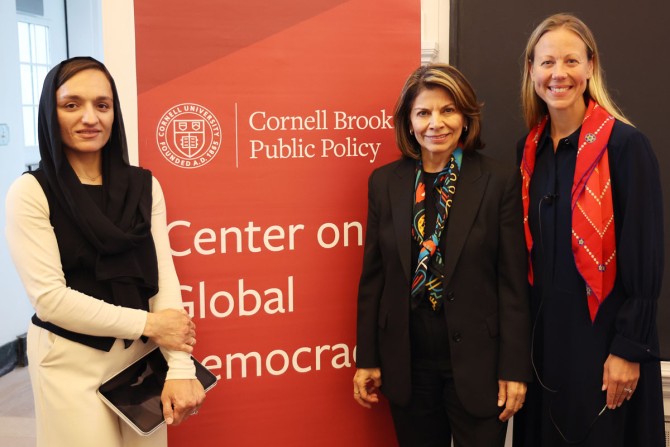Former Costa Rican President Laura Chinchilla and Afghan human rights activist Zarifa Ghafari headlined a powerful discussion on the future of democracy during a fireside chat at Cornell University's Brooks School of Public Policy on Tuesday night.
The event, titled "Democratic Leadership in a New World," featured Chinchilla, the 2025-2026 John W. Nixon '53 Distinguished Policy Fellow, in conversation with Ghafari, a Brooks MPA student and former mayor of Maidan Shahr, Afghanistan. The discussion was moderated by Professor Rachel Riedl, Peggy J. Koenig '78 Director of the Center on Global Democracy.
Speaking before a packed audience in Warren Hall, Chinchilla reflected on democracy's global challenges and enduring promise. Quoting Costa Rican poet Jorge Debravo, she reminded attendees that "true hope is sustained and nourished in daily realities," emphasizing that democracy must be defended through active participation and civic engagement.
"Democracy is not a given," Chinchilla said. "It is not enough to praise its virtues such as freedom and dignity. We must ensure that democracy is also the most effective form of government to process and respond to citizen demands."
Chinchilla, Costa Rica's first female president and a Georgetown-trained political scientist, highlighted three core ideas: that democracy requires constant maintenance, that its strength lies in people's everyday commitment, and that participation and mobilization are essential to its survival.
In response to a question from Ghafari about women's role in shaping democracy, Chinchilla stressed that inclusivity and listening are vital leadership qualities. "The most important attribute for a leader is learning how to listen," she said.
Ghafari, who fled Afghanistan after serving as one of the country's youngest and most outspoken mayors, shared her own experiences advocating for women's rights through her organization, Assistance and Promotion for Afghan Women, and Peghla FM Radio. Her work continues to bring global attention to the struggles of Afghan girls and women under the current regime.
"Extremism recognizes no borders; they can reach anyone, anywhere. Therefore, let us not take the democratic values we cherish for granted. We must continue to speak, engage, and stand firm in their defense - for we, the women of Afghanistan, know all too well what it means to live without democracy," said Ghafari.
"We have to remember that people are the most important part of democracy," Chinchilla added, calling for "innovative forms of deliberative and participatory democracy" that empower citizens to shape policies and renew the legitimacy of democratic institutions.
The discussion was part of the Brooks School's Nixon Fellows Program, which supports the Learning and Leading Through Difference Initiative-an effort to advance civil discourse, strengthen democracy, and prepare students to become thoughtful, purpose-driven leaders and the Center on Global Democracy's Democratic Dialogues series.
"This kind of intergenerational conversation between two women with firsthand experience in democracy building from different parts of the world is what we want our students to engage with," Riedl said. "It is inspiring for anyone, anywhere, and also completely grounded in specific ideas and experiences, in a way that is thought-provoking and empowering."







